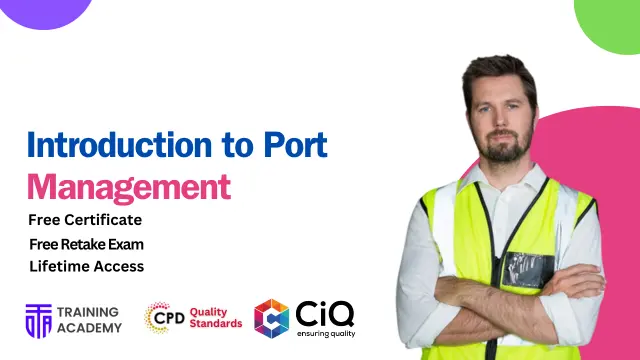
Introduction to Port management
CPD Accredited ! Free Certification | FREE Retake Exam | Lifetime Access | No Hidden Fees
Online Training Academy
Summary
- Digital certificate - Free
- Reed Courses Certificate of Completion - Free
- Tutor is available to students
Add to basket or enquire
Overview
Unlock the gateway to maritime logistics with our comprehensive "Introduction to Port Management" course. Designed for aspiring port managers and maritime professionals, this course equips you with essential knowledge and skills to thrive in the dynamic world of port operations.
Key Features:
- CPD Certified
- Free Certificate from Reed
- CIQ Approved
- Developed by Specialist
- Lifetime Access
Certificates
Digital certificate
Digital certificate - Included
Reed Courses Certificate of Completion
Digital certificate - Included
Will be downloadable when all lectures have been completed.
CPD
Curriculum
Course media
Description
In the "Introduction to Port Management" course, learners will explore the operational complexities of ports and gain insights into effective management practices. They will understand the fundamental aspects of port operations, including the types of equipment used and the handling of various cargoes and ships. The course emphasizes planning and performance management within ports, ensuring efficiency and effectiveness. Learners will also delve into critical issues such as safety, security, and environmental protection, learning how these factors impact port operations and sustainability.
Additionally, the course covers legal frameworks relevant to ports and examines the evolving technologies in ship design that influence port infrastructure and operations. Overall, students will develop a comprehensive understanding of port management, preparing them to address challenges and contribute to the growth and development of ports worldwide.
Course Curriculum
- Module 01: Introduction to Port
- Module 02: Introduction to Port Management
- Module 03: Port Equipment
- Module 04: Cargoes and Ships
- Module 05: Port Management Planning & Performance
- Module 06: Port Management Safety & Security
- Module 07: Legal Aspects of Port
- Module 08: Environmental Risks & Protection
- Module 09: Impact of Changing Ship Technology on Ports
- Module 10: Growth & Development of Port
- Understand the fundamental aspects of ports and their functions.
- Explain the principles and challenges of port management effectively.
- Identify various types of port equipment and their operational roles.
- Analyze different types of cargoes handled in ports and ship characteristics.
- Evaluate port management strategies for planning and performance improvement.
- Discuss the importance of safety, security, legal, and environmental considerations in ports.
Who is this course for?
- Port management professionals seeking foundational knowledge.
- Maritime industry professionals aiming to enhance their expertise.
- Students pursuing careers in logistics and supply chain management.
- Government officials involved in port regulation and development.
- Environmentalists interested in port sustainability practices.
Career path
- Port Operations Manager
- Port Safety Officer
- Maritime Logistics Coordinator
- Environmental Compliance Specialist
- Port Security Manager
- Cargo Handling Supervisor
Questions and answers
Currently there are no Q&As for this course. Be the first to ask a question.
Reviews
Currently there are no reviews for this course. Be the first to leave a review.
Legal information
This course is advertised on reed.co.uk by the Course Provider, whose terms and conditions apply. Purchases are made directly from the Course Provider, and as such, content and materials are supplied by the Course Provider directly. Reed is acting as agent and not reseller in relation to this course. Reed's only responsibility is to facilitate your payment for the course. It is your responsibility to review and agree to the Course Provider's terms and conditions and satisfy yourself as to the suitability of the course you intend to purchase. Reed will not have any responsibility for the content of the course and/or associated materials.


